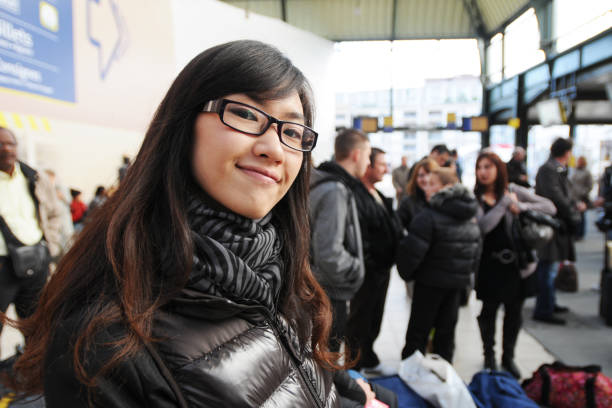How expensive is it to study abroad in korea
Studying abroad is an exciting opportunity, and South Korea has emerged as one of the most popular destinations for international students. Known for its dynamic education system, cutting-edge technology, rich culture, and vibrant student life, Korea attracts students from all over the world. However, before embarking on this academic adventure, it’s important to understand the costs associated with studying in Korea.
So, the question is, How expensive is it to study abroad in Korea? This article will provide a comprehensive breakdown of the expenses you can expect and offer tips on how to make studying in Korea more affordable.
Introduction: Why Choose Korea for Study Abroad?

South Korea has become a hub for international students due to its world-class universities, technological advancements, and unique blend of modernity and tradition. Cities like Seoul, Busan, and Incheon offer a high standard of living, excellent public transportation systems, and diverse cultural experiences.
Additionally, Korea offers a wide range of scholarship opportunities and affordable healthcare, making it an attractive destination for students worldwide. However, before making the leap, understanding the financial implications is crucial for planning a successful and stress-free study abroad experience.
How expensive is it to study abroad in Korea – Overview of Costs for Studying in Korea
The cost of studying in Korea can vary greatly depending on factors such as the university you attend, your lifestyle, and the city where you live. Below is a breakdown of the primary costs international students will incur during their studies.
Tuition Fees at Korean Universities
Korean universities offer competitive tuition rates compared to institutions in other developed countries, but the fees can still be a significant financial commitment for international students.
Costs for Public Universities
Public universities in Korea generally offer lower tuition rates for both domestic and international students. On average, tuition fees range between ₩2,000,000 to ₩5,000,000 per semester (approximately $1,600 – $4,000 USD), depending on the program and level of study. For example, the prestigious Seoul National University (SNU) typically charges international students around ₩3,500,000 per semester (~$3,000 USD) for undergraduate programs.
For more information on tuition at public universities, you can visit the Seoul National University tuition page.
Costs for Private Universities
Private universities tend to charge higher tuition fees compared to public institutions. The average tuition for international students at private universities is typically between ₩3,000,000 to ₩6,000,000 per semester (around $2,400 – $4,800 USD). Universities such as Yonsei University, Korea University, and Ewha Womans University are known for their strong academic programs but come with a higher price tag.
Visit Yonsei University’s international tuition page for more specific cost details.
Application Fees and Administrative Costs
In addition to tuition, international students will incur application and administrative fees, which can range from ₩50,000 to ₩100,000 (approximately $40 – $80 USD). This may include application fees, visa processing fees, and costs related to document translation or notarization.
Some universities may also charge additional fees for student services, library access, and academic resources. Be sure to confirm these extra costs with your university.
Living Expenses in Korea for International Students

In addition to tuition, living expenses are one of the biggest financial considerations for international students. The cost of living in Korea depends on your lifestyle, the city in which you reside, and your accommodation choices.
Accommodation Costs: Dormitories vs. Apartments
Accommodation is typically one of the largest expenses for international students in Korea. Students have the option of living in university dormitories or renting off-campus apartments.
University Dormitory Options
University dormitories are the most affordable accommodation option, with prices ranging from ₩500,000 to ₩1,000,000 per month (approximately $400 – $800 USD). Dormitories often offer the benefit of being located on campus, which can save time and transportation costs. However, the living space may be smaller, and you may need to share a room with a roommate.
For example, at Seoul National University, dormitory fees range from ₩700,000 to ₩1,000,000 per month (~$600 – $800 USD), depending on the type of room.
Renting Off-Campus Housing
Renting an apartment or a house off-campus is more expensive than living in a dormitory. Rent prices for a one-room apartment in major cities like Seoul can range from ₩500,000 to ₩1,500,000 per month (~$400 – $1,200 USD). Keep in mind that you will also need to pay a key money deposit (often ₩5,000,000 to ₩10,000,000 or $4,000 – $8,000 USD), which is refundable at the end of the lease.
For more information on housing, check out Korean university
Food and Dining Expenses
Korea offers a wide variety of affordable food options for students, including both campus meal plans and eating out at local restaurants.
Campus Meal Plans
University campuses often provide meal plans for students, which are usually affordable. Meal plans at universities can cost around ₩200,000 to ₩300,000 per month (~$160 – $240 USD). These plans typically cover breakfast, lunch, and dinner in university cafeterias.
Eating Out and Grocery Costs
Eating out at inexpensive restaurants or food stalls is relatively affordable, with meals costing around ₩5,000 to ₩10,000 per meal ($4 – $8 USD). Grocery costs vary but are generally low, especially if you buy local products. Expect to spend approximately ₩150,000 to ₩300,000 ($120 – USD 240) per month on groceries.
Transportation Costs in Korea
Korea has an efficient and affordable public transportation system.
Public Transport Options
The subway, buses, and trains are the most common modes of transport. A single subway ride typically costs ₩1,250 (about $1 USD). If you use public transport daily, you might spend between ₩50,000 to ₩100,000 (~$40 – $80 USD) per month.
Owning or Renting a Vehicle
Owning a car in Korea is not necessary for most students, as public transport is widely available and reliable. However, if you plan on renting a vehicle, you can expect rental prices to be between ₩500,000 to ₩1,000,000 (~$400 – $800 USD) per month.
Miscellaneous Living Costs
Healthcare and Insurance Costs
Healthcare in Korea is excellent, but international students are required to have health insurance. The cost for health insurance is typically around ₩100,000 to ₩200,000 per year (~$80 – $160 USD), which is often included in your university’s fee structure.
Entertainment and Leisure Activities
Korea offers a wide range of entertainment options, including cinemas, museums, shopping, and nightlife. The average cost for leisure activities can range from ₩200,000 to ₩400,000 (~$160 – $320 USD) per month, depending on how often you engage in entertainment.
Scholarships and Financial Aid Opportunities in Korea

Studying in Korea can be expensive, but there are numerous scholarships and financial aid options available to international students.
Government-Funded Scholarships
The South Korean government offers several scholarship programs for international students, including the Global Korea Scholarship (GKS). GKS covers tuition, airfare, and living expenses, making it an excellent option for students looking to reduce costs.
For more details, visit Global Korea Scholarship website.
University-Specific Scholarships
Many Korean universities offer merit-based scholarships for international students. These scholarships often cover tuition fees and sometimes even living expenses. For instance, Yonsei University provides various scholarships for international students based on academic performance and financial need.
Private Organization and Corporate Scholarships
Private organizations, including multinational corporations and local foundations, offer scholarships to international students. Programs like the Samsung Global Scholarship and Hyundai Scholarship are competitive but offer significant financial support.
Part-Time Work Opportunities for Students
International students in Korea are allowed to work part-time while studying, provided they have the necessary visa permits.
Types of Jobs Available
Common part-time jobs for international students include teaching English, working in cafes or restaurants, and tutoring. Many students also work on campus in administrative or research assistant roles.
Earnings and Work Limitations
The average hourly wage for part-time jobs in Korea is around ₩8,000 to ₩10,000 (~$6 – $8 USD). International students can work up to 20 hours per week during the semester and up to 40 hours during vacations.
ALSO READ:
| How to Get a Scholarship in UK for an International Student: A Step-by-Step Guide |
| Marshall Scholarship GPA |
Financial Planning Tips for Studying Abroad in Korea
Budgeting Strategies for Students
Creating a realistic budget before you arrive in Korea is essential for managing your finances. Track your income and expenses and be sure to account for all costs, including tuition, accommodation, food, transportation, and entertainment.
Cost-Saving Tips for Daily Living
- Use public transportation instead of taxis or rental cars.
- Cook at home instead of eating out frequently.
- Look for student discounts on entertainment and shopping.
Challenges and Hidden Costs to Watch Out For
Cultural Adjustments and Initial Expenses
Moving to a new country can bring unexpected expenses, such as buying winter clothing, setting up a mobile phone, and purchasing essential household items.
Unforeseen Costs During Studies
Unexpected costs may include medical emergencies, visa renewals, or additional academic expenses like textbooks and materials.
FAQs on the Cost of Studying Abroad in Korea
What is the average monthly budget for an international student in Korea?
On average, international students in Korea spend around ₩1,500,000 to ₩2,000,000 (~$1,200 – $1,600 USD) per month, including tuition, living expenses, and leisure activities.
Are there affordable housing options for international students in Korea?
Yes, university dormitories are the most affordable option for international students, with monthly fees ranging from ₩500,000 to ₩1,000,000 (~$400 – $800 USD).
How much do students typically spend on food in Korea?
International students typically spend around ₩150,000 to ₩300,000 (~$120 – $240 USD) per month on groceries, and eating out can cost ₩5,000 to ₩10,000 per meal.
What are the top scholarships for international students in Korea?
Top scholarships include the Global Korea Scholarship, university-specific scholarships, and private corporate scholarships.
Can international students in Korea work part-time?
Yes, international students can work part-time, typically earning around ₩8,000 to ₩10,000 per hour.
Is studying in Korea more expensive than in other countries?
Studying in Korea is generally less expensive than in countries like the USA, UK, and Australia, but it is still important to plan your finances carefully.
Conclusion: Is Studying in Korea Worth the Cost?

While studying in Korea may involve significant expenses, the overall cost is relatively affordable compared to other top study-abroad destinations. With plenty of scholarships, part-time work opportunities, and a relatively low cost of living, Korea offers great value for international students. With proper financial planning and a bit of budgeting, studying in Korea can be a rewarding and affordable experience.







